Summer brings fun in the sun. From family picnics to beach vacations to outdoor sports — it’s a bright idea to protect yourself while enjoying those rays.
As nice as it feels to bask in the sun, the light and heat can pose both short- and long-term risks, like:
- Severe sunburn
- Heat exhaustion
- Skin cancer
- Eye damage
The good news is that it’s easy to take simple measures that will let you enjoy your time in the sun while reducing your risks. Here are our best expert tips for sun safety.
Keep Your Body Cool and Hydrated
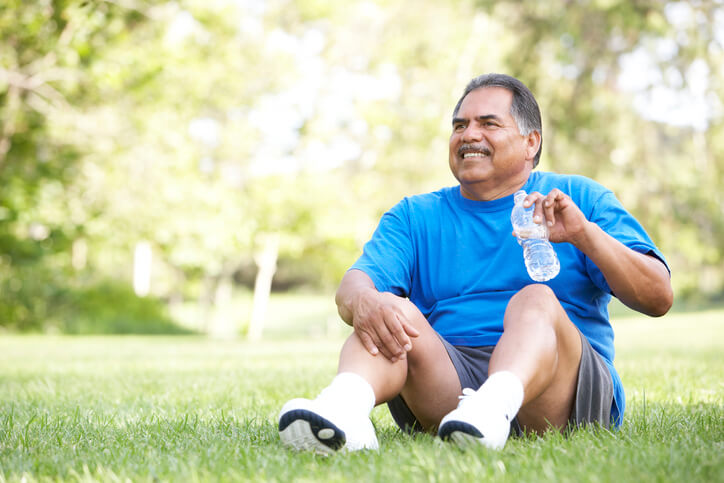
One big problem on hot, sunny days is dehydration. “People working out in the yard or playing sports can get pretty severely dehydrated,” says Jay Woody, M.D. founder of Legacy ER & Urgent Care in Texas. And, as you age, your risk for dehydration increases, according to the Mayo Clinic. “So, adults 50 and up should be especially vigilant,” he says. Here’s how:
- Hydrate before you leave home. Your sun safety starts even before you’re in the sun. Drink 16 to 20 ounces of liquid before going outside. To avoid dehydration while you’re outdoors, take in another six to 12 ounces every 10 or 15 minutes. And after you go back inside, consume another 16 to 24 ounces. It’s important to hydrate proactively. Thirst signals that you’re already at least 5 to 10% less hydrated than you should be, Woody says.
- Reach for the right beverage. If you plan to spend less than an hour outside doing a less strenuous activity like walking, you can count on water to keep you hydrated, according to the Cleveland Clinic. But if you’ll be outside for longer than an hour or are engaging in a more strenuous activity, like tennis or pickleball, grab a sports drink.
- Pay attention to your body. There are three types of heat-related illness: heat cramps, the mildest form; heat exhaustion, which is worse; and heatstroke, which can be deadly. “If you’re out in the heat and you start feeling ill – for example, you feel tired, start sweating severely or experience muscle cramps – get out of the sun and into a cool place, drink fluids and sit in front of a fan if possible,” Woody says.
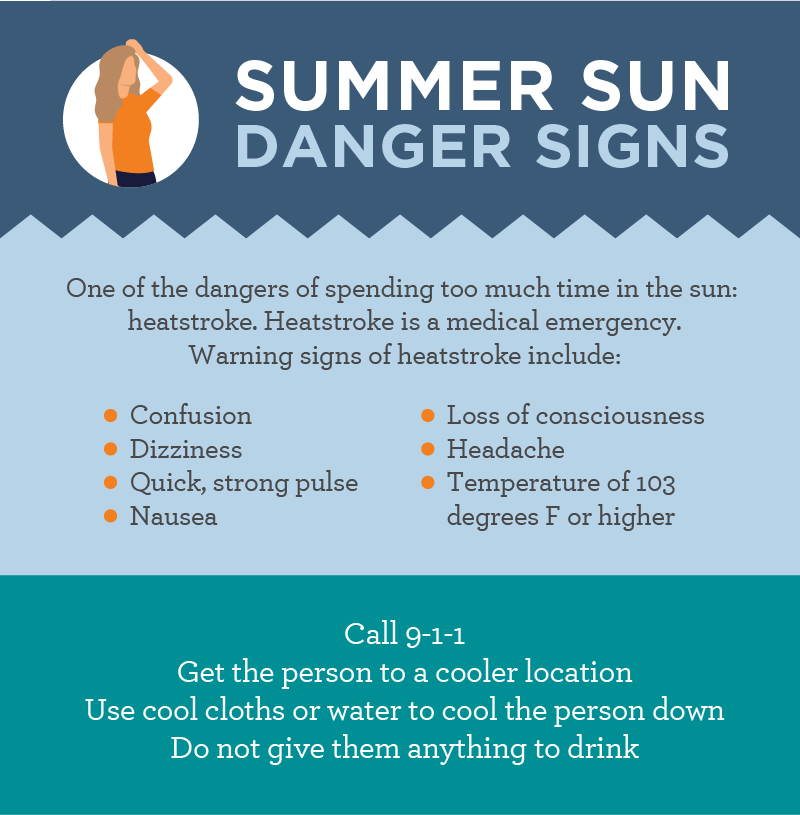
Safeguard Your Skin From the Sun

We all know the sun’s UV radiation can cause sunburns and skin cancer. But did you know the sun can harm your skin in just 15 minutes?
“Any time you go outside, it’s crucial to protect your skin from the sun,” says David Bank, M.D., assistant clinical professor of dermatology at Columbia Presbyterian Medical Center, in New York, and author of Beautiful Skin: Every Woman’s Guide to Looking Her Best at Any Age. Here are some expert tips for protecting your skin in the sun:
- Slather on sunscreen. The Skin Cancer Foundation recommends putting on two tablespoons of sunscreen a half hour before going out into the sun, and then reapplying it every two hours or right after sweating or swimming. But sun safety doesn’t stop there. If, you’re going to be outside for longer than a few minutes, especially if you’ll be sweating or swimming, use a water resistant sunscreen. And in that case, use a sunscreen of at least SPF 30. “The best sunscreen is one you will use,” Bank says.
- Add extra layers of sun protection. “Consider wearing a hat with a brim and sun blocking clothing,” Bank says. But don’t count on clothes to replace sunscreen, the U.S. Centers for Disease Control and Prevention warns. A typical T-shirt offers you less protection than an SPF 15 sunscreen. A dry shirt will protect you more than a wet one. Dark clothing will shield you from the rays better than lighter colored clothes.
- Be aware of sun sensitivity. Some over-the-counter and prescription medications can cause increased sensitivity to the sun. “If you’re taking one of these drugs, take extra precautions such as wearing a floppy hat and trying to stay in the shade when possible,” Bank says. The list of drugs that cause photo sensitivity include: some antibiotics, some antihistamines, some heart medications, statins and non-steroidal anti-inflammatory drugs (NSAIDS). The U.S. Food & Drug Administration offers a list of drugs that can cause sensitivity to sun. “Someone might be taking Advil for their tennis elbow and not even realize it makes them more sensitive to the sun,” Bank says.
Protect Your Eyes From the Rays
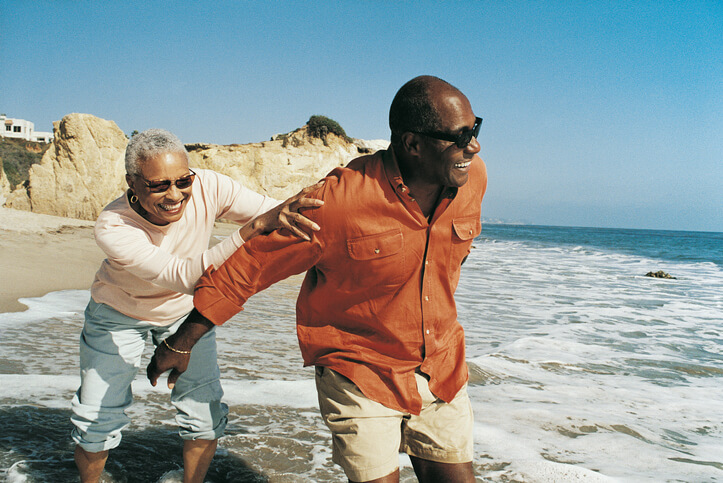
Your skin isn’t the only body part that can be harmed by the sun. So, be on the lookout for ways to safeguard your eyes from the sun’s rays, too.
“As with the skin, the sun poses both short-term and long-term dangers to the eyes,” says Brian Boxer Wachler, M.D., a Beverly Hills, California eye surgeon.
“For example, the sun can cause burns to the corneas, which can cause pain and blurry vision until the surface of the cornea heals,” Boxer Wachler says. Over time, sun damage can lead to skin cancer around the eyes, earlier development of cataracts and damage to the whites of the eyes. Here are a few ways to protect your eyes in summer:
- Wear the right sunglasses. You don’t have to drop a lot of cash on a pair of sunglasses to keep your eyes safe. In fact, Boxer Wachler and some colleagues bought and tested cheap sunglasses from stores in Venice Beach, California. “The researchers found that all the sunglasses had ‘outstanding UV protection,'” Boxer Wachler says. Get a basic pair from a reputable brand. “Go for a wraparound frame design that hugs the sides of your face for maximum protection,” he says. “Sunglasses are like sunscreen for the eyes,” Boxer Wachler says.
- Shield your eyes while driving. Never thought about sun safety in your car? You’ll want to check your car windows to see just how much UV light gets through while you’re driving. Boxer Wachler Vision Institute offers a free UV meter card that you can order through their website. “If your windows are letting in too much UV light, you can have an aftermarket UV-blocking film installed on your side windows,” Boxer Wachler says.
Remember to plan for your summer fun by stocking up on sunscreen, a floppy hat, sunglasses and maybe even some sports drinks. “Check the weather and take extra precautions on those days when the heat index gets very high,” Woody says. “You have to be prepared for those hot, sunny days.”
What do you do to stay safe and comfortable on hot summer days? Let us know in the comments about your best sun safety tips.


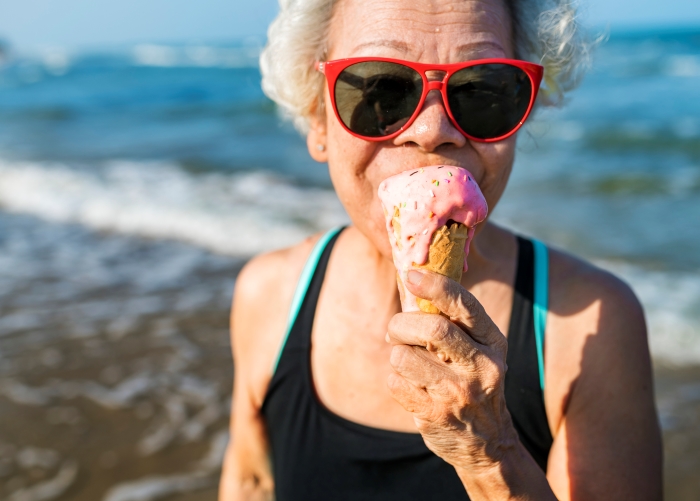
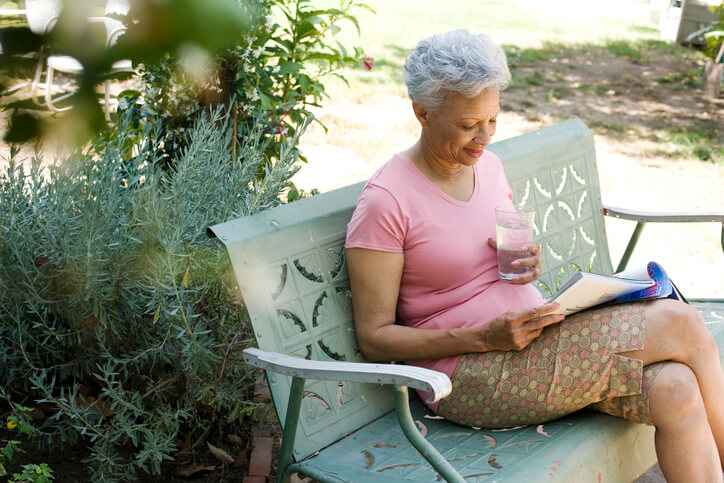



Another sun tip. I started drinking Ryze mushroom coffee around late March and I have gotten sunburned this spring three times because I lay out for two hours. I never laid out before but now I have a reason to want to. Check into earthing on youtube videos. Anyway, the burn, which develops into a true sunburn as I sleep goes away once I drink a cup of mushroom coffee. My skin does not peel, either. As for earthing, I am laying down and doing a snow angel and scare crow at each stage and my lifelong scoliosis and awful posture is healing.
sun is good & bad ===so we have to act good & bad also === thanks for your concern & god bless ++++++++++
I tried to request a free UV meter for my windshield, but the process is VERY confusing. Even though I put in all the information asked for in the form, it also wanted me to “select” boxes with pictures in them – it went on and on and on. I finally gave up. Who designed that anyway?????
Very frustrating to learn that the free UV test card for car windows is no longer available! How can I obtain one of these?
Re: UV film for windows. You should mention not to break laws that restrict too deep dark tint for car windows.
Several years ago, at a Walgreen’s drugstore in Tucson, I bought an inexpensive solar powered fan which is designed to fit in a car’s side window. It has a gasket to make the fan fit. I put it on the side which is facing the sun, and it exhausts hot air from the car’s interior.
Good tip, Elizabeth. And it works well for you?
First of all, I always keep it parked in the garage when I’m at home. When I’m out and about, I try to park in a shady spot; or with the front of the car facing away from the sun. If those options aren’t possible, I use a reflective sun shade; which can be quickly set up across my front windshield on the inside of the car.